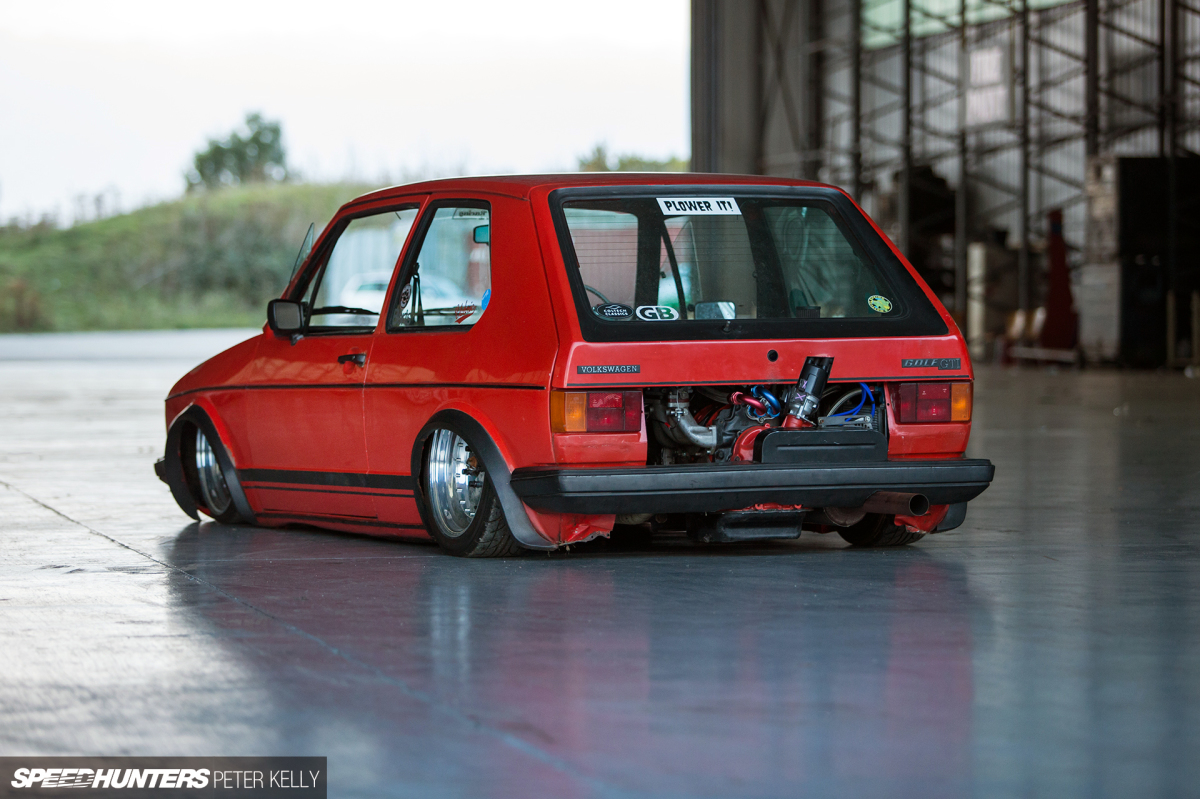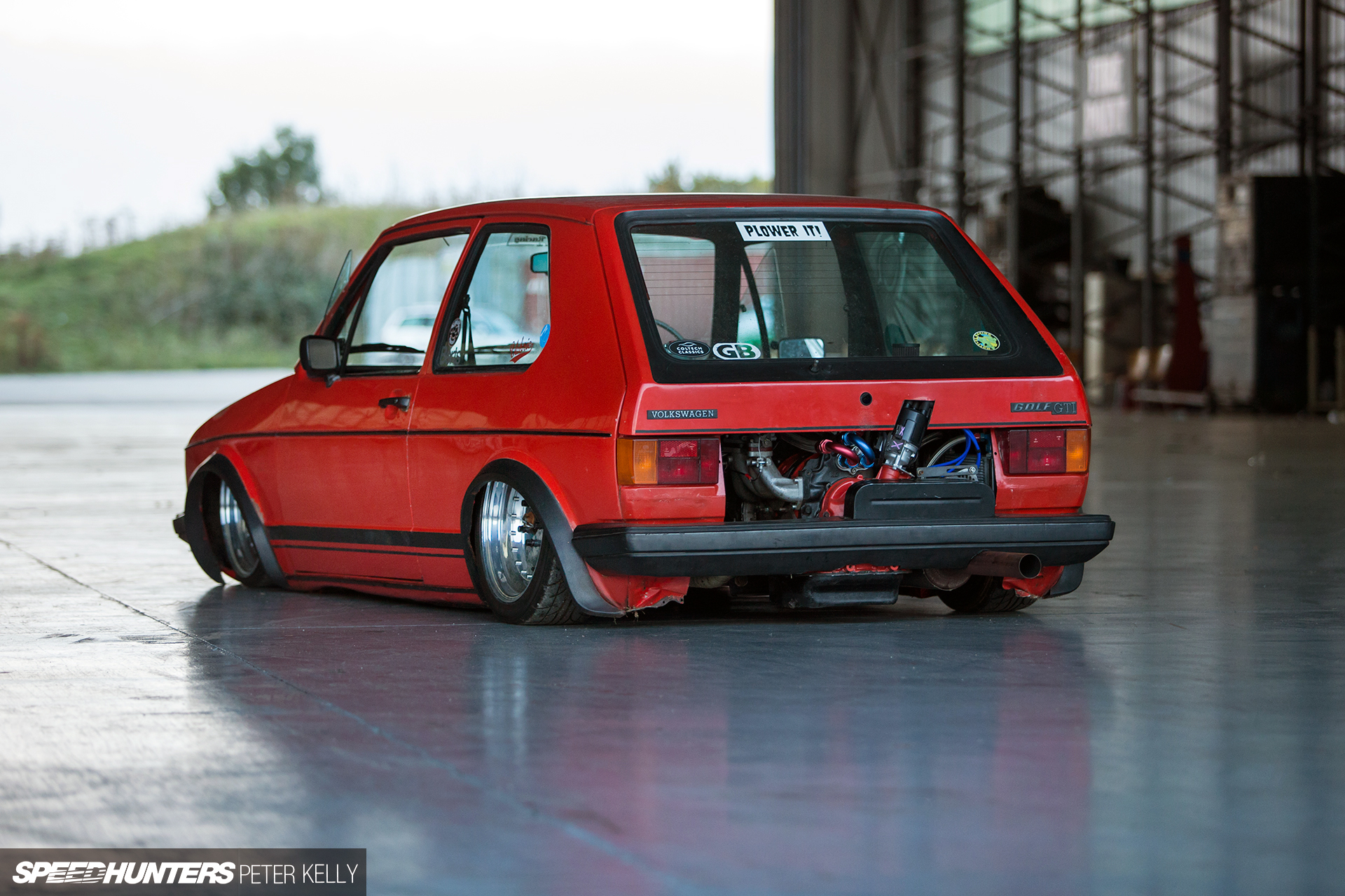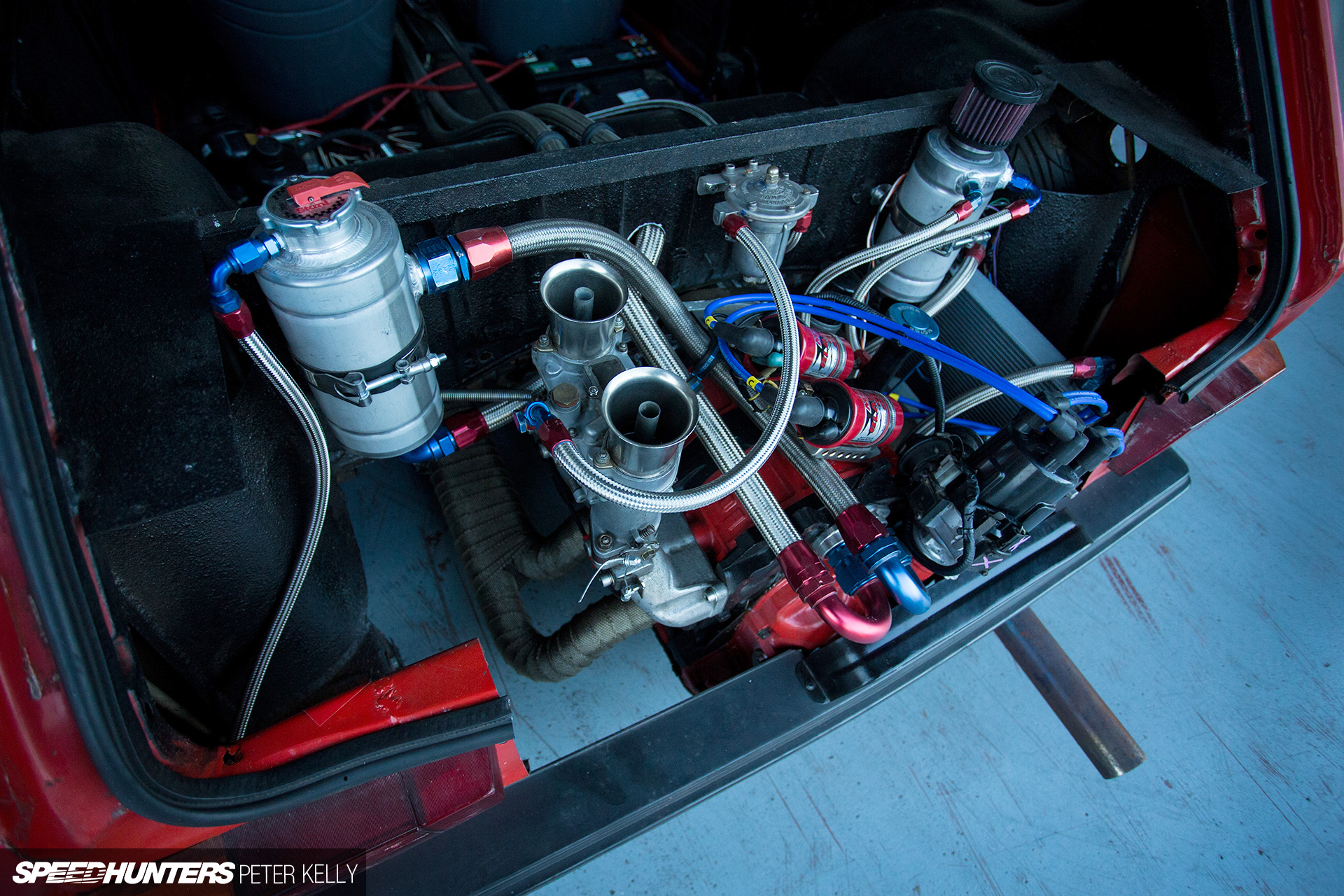
A couple of weeks ago, we revisited a Mk3 Volkswagen Golf, featuring all-wheel-drive and a Precision 6266 turbocharged VR6 engine, pushing over 550whp. True to the spirit of Gatebil, this Golf was engineered for all-out performance.
For this week’s throwback post, we’re revisiting a different type of Golf build. In fact, in the world of custom Golfs, we’ve never encountered anything quite like Pipey McGraw‘s Mk1 GTI – an slammed-to-the-ground creation with VW Beetle underpinnings and a pulsating Mazda rotary engine.

SECOND CHAPTER
2014 FeatureIf there’s one sound I have a truly tuned ear for, it’s the pulse of a Mazda rotary; there’s just nothing else quite like it. As many readers might know, my home country of New Zealand is a wankel enthusiast’s mecca and I have grown up with the idle of ported rotary engines ringing in my ears.
While in England recently attending the 2014 Players Show at North Weald Airfield, that familiar rhythmic pulse was the last thing I expected to hear, but there it was, ebbing towards me as soon as I opened the door of my rental car. Like the smell of an ex’s perfume or a particular song from your teenage years, the brap brap brap sound instantly brought back memories for me: the traditional Kiwi summer spent cruising the beach spots as RX-2s, RX-3s, RX-7s and all the rest rolled past. Hearing this sound in the middle of an airfield in the UK, with a biting blustery wind cutting right through my jumper, I felt nostalgic – patriotic even – and I had to know more.

The faint pulse had disappeared before I’d even finished getting my camera gear out, and with only a rough direction in which to start hunting, I began my search for the elusive Mazda. As you’ve no doubt already guessed by looking at these images, it would turn out that I was looking for entirely the wrong car. After plenty of aimless wandering and head scratching, I finally saw the tell-tale distributor and upwards-sweeping IDA carburettor manifold – sticking out the boot of a Mk1 Volkswagen Golf GTI. Well, that’s a first…

What exactly was I looking at and why? More information was needed, and I eventually found the owner, Pipey McGraw, who was able to fill me in on the details. It turns out this is really only partially a Golf. In truth, it’s probably more of a 1970 VW Beetle, though it’s registered as an ‘SMT ULC’. It’s also completely street legal.

Pipey kicked off his project back in early 2012 after finding this GTI body, which had had the bottom cut out and placed over the top of a scrap Beetle pan with a few tack welds to hold it in place. What he first thought would be a quick weekend fix-up for a laugh has turned into a life-consuming labour of love for the Bournemouth local and his mates. Besides the Golf shell itself, nothing else now remains from the project he originally purchased.

The first Beetle chassis was scrapped and replaced with a nearly all-new pan, which uses a spine from a 1970 Beetle and brand new floor pans, front frame head panel and rear spring plates. British MOT rules dictate that the floor pan of a car cannot be modified, so all the work went into the body, fabricating strengthened mounting points that aligned with the Beetle’s stock points. Pipey also used the opportunity to sit the mounts up higher, resulting in a 4-inch body drop. This allows the GTI portion of the car to sit extremely low to the ground while the Beetle chassis remains at a more reasonable height, which also allows the car to retain some reasonable suspension geometry.

Although the body itself is clearly a little beaten up, that’s exactly how Pipey wanted it. He says that although he appreciates all the work that goes into immaculate show builds, it just isn’t him – there’s something to be said for battle scars and character. Although nothing has been repaired as such, originally this body looked like it had been sitting in the sun for 30 years; it had turned shades of pink and white, and was completely rough to the touch. Pipey spent countless hours sanding back the tired paint and polishing it up, resulting in a strange high-sheen, yet ratty look.

Another Beetle has been raided for its bulkhead, which was then welded into the Golf body. In a rush to get the VW done for the summer of 2013, the car ran a stock Beetle air-cooled flat four that Pipey had lying around behind that bulkhead. The car travelled so well, performing faultlessly on big trips to the huge RadikalBugz and European Bug In meets in Belgium, that Pipey decided to stick with the motor for the rest of the year. As you can now see though, he soon grew bored: Pipey needed something with more power. Although the easy option would have been to build a monster VW mill, it wasn’t going to be weird and different enough for Pipey. It was time to look farther abroad.

With only very limited space available, Pipey needed a motor that would be small enough to fit, yet still provide a big upgrade in power over the stock flat four (that’s not really the hardest of asks, mind you). Plenty of time was spent researching the matter, but eventually it was the countless videos of angry rotary-powered machines pulsing away that can be found online, and a subsequent search that turned up off the shelf Mazda-to-VW gearbox adapters, that convinced Pipey to go with a Hiroshima screamer. This was found in the form of an early twin-rotor 1300cc 13B, originally from a Series 3 RX-7.

Upon trial fitting the rotary, it quickly became clear that the sump of the Mazda motor hung a good couple of inches lower than the VW engine’s, and with the car being so low, it was genuine cause for concern. Pipey and friends fabricated new mounts for the 4-speed VW Type 2 Transporter gearbox that had been adapted to the motor, and then cut into the bulkhead to allow the box and motor to sit two inches higher. Finally, after plenty more hours spent sorting out the wiring and cooling and with a summer full of events fast approaching, it was time to start the Mazda-powered VW up.

Unfortunately, the ‘great running engine’ Pipey had purchased turned out to be a complete dud, and not long after it was fired up for the first time, it dropped a rotor and fell to pieces. With only two weeks until the 2013 Retro Rides Gathering in Worcester, Pipey now had himself a dead duck, and spirits were low – but it wouldn’t last. Help came from Carl and the team at Hayward Rotary in Berkshire, who dropped everything to get the motor apart and not just fixed up, but transformed into a monster.

The block has now been fully bridgeported and runs high-compression Series 5 RX-7 rotors with Hayward’s own highly-regarded apex seals. Rotary engine porting, for those who may not have had much to do with these motors in the past, involves enlarging the intake and exhaust ports to allow more air and fuel into and out of the engine, similar in concept to porting/polishing the head and fitting a more aggressive camshaft/s into a piston motor. The ‘bridgeport’ specifically refers to a process of not only enlarging the standard port, but creating a second thin port just above it, almost like an eyebrow to an eye. The bridge that is left between the two ports ensures that the corner seals of the rotor don’t fall out and make mincemeat of the motor.

The engine now pulls air and fuel through a 46mm Weber IDA carb, which is bolted to a port-matched Racing Beat manifold and was originally pulled off a Porsche 914 race car.

Spark is provided to RX-8 plugs by a pair of MSD Blaster coils via big Magnacor leads.

Big braided water lines can be seen running from the rear of the car to the front, where a radiator is located between the two enlarged wheel tubs.

A bridgeported motor requires a whole lot of breathing room, so in order for the 13B to exhale efficiently, a custom set of headers was fabbed up, which dump into a short exhaust pipe running down below the bumper. As you can imagine, with such a short exhaust tract, this car isn’t exactly the quietest…

Though the motor hasn’t been dyno tested, wisdom states that it should be making somewhere around the 250hp at the flywheel mark – a good five times more than the stock air-cooled flat four that was in the car previously. Though the big hike in power was great, it made the car scary to drive on its current static suspension set up. It was time to make this machine a little more practical.

Sure, Pipey had already been driving this car around for a good year crazy-low on static suspension, but for the sake of practicality he decided to acquire a Rayvern hydraulic suspension set up, which has been designed specifically for the Bug platform. He admits that it’s the one big thing he doesn’t like about the car, but at some point, you’ve got to be realistic about practicality, and nothing screams practical like being able to lift your car and drive without being followed by fireworks as your panels go toe-to-toe with the road surface.

The set up runs hydraulic rams with inline shock absorbers and adjustable rear spring plates. The front beam has also been narrowed considerably, which Pipey carried out firstly because it’s a traditional aircooled Bug modification, and because it also allows the front wheels to achieve full lock.

The two-piece drag-style wheels measure 16×6 inches and were made to Pipey’s specifications in California by Custom Metal Spinning, before being sent over to the UK. In this image you can see just how far inside the fenders the front wheels sit.

Like the rest of the VW, the interior has a very rat-bug feel about it and is pieced together from various bits and bobs. With that said, Pipey says that he wouldn’t mind going for a more complete interior some time in the near future.

For now though, the bead-rolled dash is about as simple as it gets and houses an array of gauges from an Audi 80.

The steering wheel has been custom made by Coltech Classics, using a variety of bits and pieces from vintage euros.

These awesome Vabric tweed-trimmed bomber seats are by far my favourite addition though, and they suit the style of the build perfectly.

With its sparse Beetle interior, ratty Golf GTI exterior and raucous Mazda engine jutting from its boot, Pipey’s car is what some might call a European hot rod of sorts. It’s made of up so many different vehicles, and is about as far from the stock car – whichever one you choose – as is possible. Considering it’s completely street legal and it has driven all over Europe, we have to wonder how a car like this is received by all the people that pass it by on the roads.

“It’s not a very inconspicuous car at all,” Pipey says matter-of-factly. “From the second I roll out the drive to the second I turn it off at my destination people just seem to go crazy on the roads. People have stopped traffic on the M25 to take photos of it rolling. Others try and pull me over to talk about the car; my lip reading’s great now – you can clearly see people swearing. I think the thing that baffles people most is how low it is and how I can physically drive it on the road. From kids to grandparents – every time I stop someone’s running over to the car trying to take photos or talk to me about it.”

We’re well aware that this mash-up-mobile isn’t for everyone, and that’s exactly what both we and Pipey himself love about it. It’s an outside-the-box, unique creation that has served as both a talking point for anyone Pipey meets, and a campfire of sorts. A place that friends can gather around, have a laugh and build something interesting at the same time. “For me, my favourite thing about this car is looking at it and thinking about the three years of hard work that has gone into it. I’m extremely lucky to have the friends I do that have put up with this stupid car for so long. I like the fact it causes such a reaction of passion from people when they see it. From absolute love to extreme hatred, it gets people talking regardless, whether they understand it or not.”
The Speedhunters
Instagram: thespeedhunters
Peter Kelly
Instagram: pedeykelly



































This is such an incredible build! The combination of a classic VW Golf GTI body, Beetle chassis, and a Mazda rotary engine is as unique as it gets. It’s amazing how much work went into making everything fit and perform, especially considering how much passion Pipey put into it. The choice of the 13B rotary engine adds so much character and power, and the aesthetic of the build with the ratty look and custom touches just makes it stand out even more. It's truly a one-of-a-kind machine that not only turns heads but sparks conversation everywhere it goes. Definitely a true testament to creative engineering and car culture!